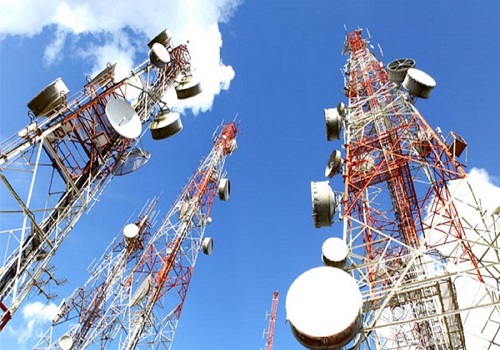
Riding on the deployment of the fifth generation (5G) technology by the three licencees, MTN Nigeria, Mafab Communications and Airtel Nigeria, the telecoms industry is expected to take a firmer foothold in the country. In line with the promise of President Bola Tinubu, more digital jobs are expected during the year. The industry, however, would either be made or marred by two problems, if not resolved amicably and quickly too, LUCAS AJANAKU reports.
President Bola Tinubu has never failed to acknowledge the place of technology in the scheme of things and its ability to produce revolutionising results.
Thus when a delegation from Google (West Africa) led by its Director, Olumide Balogun, paid him a courtesy visit in the State House, Abuja, last year, the president did not mince words as he declared that his administration would leverage digital technology to create the desired socio-economic progress that is necessary to transform society.
He reaffirmed his determination to use education and technology to improve the lives of the citizens, arguing that education is central to uplifting Nigerians.
“We are here to shape our tomorrow, today, and I’m going to do it. Our youths represent over 65 per cent of the yearning development age in Nigeria. We take education very seriously, and that is the foremost tool we have against poverty.
“The digital economy and telecommunications represent the future, and we are determined to promote it.
“Your partnership with us to make it a serious development in our economic programme is what is desirable. Our youths have the skills, they are brilliant, and they are good people,” Tinubu had said.
Undoubtedly, the Information Communication Technology (ICT) sector has become very important to the economy. It is playing a very crucial role in the economic diversification push of the government from oil to non-oil.
Stats from the Nigerian Communications Commission (NCC) and National Bureau of Statistics (NBS) would show the significance of the sector to the economy. The sector added 15.97 per cent growth to the nation”s real Gross Domestic Product (GDP) in Q3 of last year largely driven by the telecommunications industry.
This showed an increase in contribution when compared to the 15.35 per cent recorded in the same period the year before (2022).
However, when compared with the figure recorded in the preceding quarter (Q2 2023) the sector contributed less in Q3. NBS said ICT contributed 19.54 per cent to the real GDP in Q2, which made the Q3 figure decline.
ICT sector was segmented into four by NBS to include Telecommunications and Information Services; Publishing; Motion Picture, Sound Recording, and Music Production; and Broadcasting.
For emphasis, the ICT sector in Q3 recorded a growth rate of 6.69 per cent in real terms, year-on-year. This was driven largely by activities in the telecommunications sub-sector, which contributed 13.5 per cent to the GDP in the real term.
The closest sub-sector to telecoms in the ICT sector in terms of contribution was broadcasting, which added 1.39 per cent. According to the NBS data, the ICT sector contributed 11.57 per cent to the total Nominal GDP in Q3 2023, higher than the 9.58 per cent recorded in the preceding quarter of 2022 and lower than the 14.83 per cent it contributed in the preceding quarter.
NBS added that from the rate recorded in the corresponding period of 2022, there was a decrease of 3.84 per cent points.
“On a quarter-on-quarter, the sector exhibited a growth of -10.30 per cent in real terms. Of total real GDP, the sector contributed 15.97 per cent in the 2023 third quarter, higher than in the same quarter of the previous year in which it represented 15.35 per cent and lower than the preceding quarter in which it represented 19.54 per cent,” NBS added.
Similarly, from an initial investment profile of $500 million as at 2001 when the sector was fully liberalised, both domestic and foreign investment rose to $68 billion in 2018 and increased to $70.5 billion in 2019 and $72 billion in 2020. At the end of 2021, the figure rose to $75,560,563,417.79 ($75.6 billion).
The latest figure is the official investment profile computed in the industry up from the initial $70 billion investment in the last few years.
The NBS said the telecoms sector contributed N10.126 trillion as an aggregate quarterly contribution to GDP in 2022.
“In the first quarter, the sector contributed 12.94 per cent equivalent to N2.246 trillion while the second quarter witnessed an all-time high GDP contribution by the telecoms sector to the nation’s economy, standing at 15 per cent and valued at N2.593 trillion.The sector’s contribution to GDP in the third was 12.85 per cent and in the fourth quarter, it grew to 13.55 per cent, which are valued at N2.436 trillion and N2.851 trillion.
“The growth trajectory continued this year as the telecommunications and Information Services sector in Nigeria delivered a handsome N2. 508 trillion in terms of financial value contribution to the nation’s gross domestic product, GDP, representing 14.13per cent in the first quarter 2023,” NCC said.
The GDP has grown steadily. From 8.50 per cent in 2015, it grew to 9.13 per cent in 2016 and to 8.66 per cent in 2017. In the last quarter of 2018, telecoms contributed 9.85 per cent to national GDP while it added 10.60 per cent in the fourth quarter of 2019.
It is clear from the above analysis that the ICT sector is a game changer to the economy and would continue to do so if the right policies are put in place and sustained.
5G consolidation
This year, 5G is expected to gain more traction as MTN Nigeria, Mafab Communications and Airtel Nigeria have rolled out.
Despite this, coverage remained a huge challenge. According to NCC data, 0.83 per cent of the total mobile subscriptions (220.36 million) as of August 2023 were on the 5G network.
Communications, Innovations and Digital Economy Minister, Mr Bosun Tijani, blamed the low coverage on the dearth of the required infrastructure. He said 5G exists in the country.
“The infrastructure that drives 5G is not something that is across the nation. So, if you subscribe to 5G and you move into locations where the infrastructure cannot support it, of course, the quality will drop. 5G exists in Nigeria and there are telcos with the licence,” he said.
Another challenge is affordability and availability of compatible devices. No doubt, 5G is an expensive technology because the least a subscriber could get for a 5G router is N50,000. In a country where the minimum wage is only N30,000 paid by less than half of the states of the federating units, it is obvious that the technology is decidedly not meant for the poor.

ister, Nyeson Wike to grant telcos approval in the FCT to build infrastructure.
Digital jobs/skills acquisition
In line with the ambition of the Federal Government to create digital jobs, initiatives that will make this happen are expected this year.
Already, the Director of Google West Africa has reassured the government that the company is committed to supporting its laudable efforts through the deployment of modern digital technology.
Google has already okayed a N1.2 billion grant as well as train 20,000 women and children with requisite skills to establish new digital tech job opportunities to Nigeria. These skills are urgently needed to grow the economy.
Another initiative that will drive job creation this year is the launch of $617.7 million Investment in Digital and Creative Enterprises (i-DICE) programme.
Vice President Kashim Shettima emphasised the importance of the initiative to the Federal Government’s digital jobs drive, saying the administration is keen on delivering on its promises to Nigerians.
Google has already okayed a N1.2 billion grant as well as train 20,000 women and children with requisite skills to establish new digital tech job opportunities to Nigeria. These skills are urgently needed to grow the economy.
Another initiative that will drive job creation this year is the launch of $617.7 million Investment in Digital and Creative Enterprises (i-DICE) programme.
Vice President Kashim Shettima emphasised the importance of the initiative to the Federal Government’s digital jobs drive, saying the administration is keen on delivering on its promises to Nigerians.
Accordingly, he urged all partners in the i-DICE programme to ensure judicious utilisation of the funds, noting that the $617.7 million scheme could be a game changer.
“The peculiarity of the challenges we face in the country demands that we have to create jobs for our teeming youths to address the crises associated with youth unemployment. I want to appeal to all of us here to unite and see that this programme takes off latest by the end of November this year.
“I am interested in getting a weekly update on what is being done to kick-start this programme. We also need to spread out to cover the whole country so that there is inclusivity. If we judiciously utilise these funds, the target impact and anticipated benefits will be immense.
“I want to assure the technical committee, all those working on this programme and our international partners that you will get all the support that you will need. We mean business. My boss, President Bola Tinubu, is passionate about the transformation of this country. So, you have nothing to worry about the government’s support,” VP Shettima had said.
Minister of Finance, Mr Wale Edun described the project as “very key to the promise of His Excellency, President Bola Ahmed Tinubu, particularly to the youth, for the creation of 1.2 million digital jobs.
“This $617 million project will go a long way to achieving the President’s priorities on job creation and economic growth, particularly inclusivity. One of the major elements is going to have 50per cent participation by women,” he added.
Mr Tijjani said: “The Nigerian technology and creative ecosystem has been doing well and is the best on the continent. We actually want to be a leader globally. And there’s no other way to do that than investing in the technology startups that are building these solutions.
“So, the government is putting its skin in the game to say ‘we want to support; we want to see more local confidence building’. And there’s no other way to show that than by putting money in some of the startups.”
Managing Director, Bank of Industry (BoI), Mr Kayode Pitan, said, “The Investment in Digital and Creative Enterprises (i-DICE) Programme programme is actually a $617 million programme. The funding has been concluded with African Development Bank (AfDB), the French Development Agency (AFD) and the Islamic Development Bank (IsDB).
“BoI also will put in some part of that funding. It will cover the digital area, the creative area and entertainment area, especially the areas that the youth are interested in. So, this is actually for the youths – people below 35. We have some grants, we have some loans. There’s some equity, and for the startups, the government is hoping that some new unicorns are going to emerge from this particular programme”.
The Minister for Europe and Foreign Affairs of the Republic of France, Catherine Colonnade, said the I-DICE program is capable of creating 65,000 startups in the country.
Colonade stated this last year when the Federal Government signed an agreement with France on the program. Nigeria’s Minister of Foreign Affairs, Yusuf Tuggar, and Colonnade signed the bilateral agreement at the Ministry of Foreign Affairs in Abuja on behalf of both countries.
Aside from the startups, she said the program would also create 150,000 direct jobs and about 1.3 million indirect jobs. “The program will create more than 65,000 start-ups, 150,000 direct jobs in the technology and creative industries sectors, and approximately 1.3 million indirect jobs,” she said.
Minister Tuggar said that with a focus on job creation, the I-DICE program is set to significantly impact young Nigerians, by assisting them to create sustainable employment opportunities, develop high-value-added industries, and contribute to the development of the Nigerian economy.
He said the program would train two million young people, while encouraging them to structure their own ecosystem, through access to financing for the creation of innovative businesses and start-ups.
He added that the program would also receive funding and support from the private sector and institutional investors adding that the BoI, as the Implementing Agency, will coordinate the day-to-day activities of the project.
Tijani said: “As part of our efforts to stimulate the growth of the Nigerian economy and mainstream the application of technology in critical sectors, we welcome the support of the French government as they collaborate with us to leapfrog technological advancements for the benefit of our startup ecosystem.
“This funding from the AFD for the I-DICE programme is a testament to France’s historical commitment to the growth of startups which is evidenced by its position as a leading startup destination in Europe,” he said.
He said the I-DICE program and the launching of France’s contribution through the signature of the Financing Agreement between the AFD and FG are perfectly in line with the existing political will and momentum to advance young Nigerians.
He added that the program falls within AFD’s strategy to promote skill development and strengthen the supply and quality of entrepreneurial training in these high-potential sectors.
USSD debt, IHS Tower, ATC MTN altercation
The unresolved debt estimated to be about N200billion between deposit money banks (DMBs) and mobile network operators (MNOs) is a major issue that would require the combined sagacity of Tijani, CBN Governor Yemi Cardoso, NCC CEO, Aminu Maida, bank CEOs and the MNOs.
The huge debts arose over a trade dispute over payment for the use of Unstructured Supplementary Service Data (USSD) by the former. USSD is a Global System for Mobile Communications (GSM) protocol that is used to send text messages and do financial transactions such as cash transfer, account balance enquiry and many others.
The dispute among IHS Tower, MTN Nigeria and American Towers Corporation (ATC) is another major issue that must urgently be addressed.
Following the emergence of ATC on the scene, there had been media speculation that the termination of the contract would lead service disruption across the country.
But MTN Nigeria, in a swift reaction, had said it has taken note of media reports saying that IHS Towers has offered the company improved terms for the lease of 2,500 sites that match the terms of ATC, which recently won the contract following a highly competitive bidding process.
These reports are not true and MTN has not received any revised offer from IHS. We announced in September that the lease for the 2,500 sites (which was due to expire in 2024 and 2025) had been awarded to ATC after a very fair and transparent procurement process.
Chief Corporate Services and Sustainability Officer at MTN Nigeria, Tobechukwu Okigbo, had said: “The agreement with ATC over the 2,500 sites is final, having gone through a rigorous process involving our highest governance approvals. Our preference is always for bilateral renewal, subject to competitive pricing and terms. In this instance the ATC proposal was superior.”
Aside from the startups, she said the program would also create 150,000 direct jobs and about 1.3 million indirect jobs. “The program will create more than 65,000 start-ups, 150,000 direct jobs in the technology and creative industries sectors, and approximately 1.3 million indirect jobs,” she said.
Minister Tuggar said that with a focus on job creation, the I-DICE program is set to significantly impact young Nigerians, by assisting them to create sustainable employment opportunities, develop high-value-added industries, and contribute to the development of the Nigerian economy.
He said the program would train two million young people, while encouraging them to structure their own ecosystem, through access to financing for the creation of innovative businesses and start-ups.
He added that the program would also receive funding and support from the private sector and institutional investors adding that the BoI, as the Implementing Agency, will coordinate the day-to-day activities of the project.
Tijani said: “As part of our efforts to stimulate the growth of the Nigerian economy and mainstream the application of technology in critical sectors, we welcome the support of the French government as they collaborate with us to leapfrog technological advancements for the benefit of our startup ecosystem.
“This funding from the AFD for the I-DICE programme is a testament to France’s historical commitment to the growth of startups which is evidenced by its position as a leading startup destination in Europe,” he said.
He said the I-DICE program and the launching of France’s contribution through the signature of the Financing Agreement between the AFD and FG are perfectly in line with the existing political will and momentum to advance young Nigerians.
He added that the program falls within AFD’s strategy to promote skill development and strengthen the supply and quality of entrepreneurial training in these high-potential sectors.
USSD debt, IHS Tower, ATC MTN altercation
The unresolved debt estimated to be about N200billion between deposit money banks (DMBs) and mobile network operators (MNOs) is a major issue that would require the combined sagacity of Tijani, CBN Governor Yemi Cardoso, NCC CEO, Aminu Maida, bank CEOs and the MNOs.
The huge debts arose over a trade dispute over payment for the use of Unstructured Supplementary Service Data (USSD) by the former. USSD is a Global System for Mobile Communications (GSM) protocol that is used to send text messages and do financial transactions such as cash transfer, account balance enquiry and many others.
The dispute among IHS Tower, MTN Nigeria and American Towers Corporation (ATC) is another major issue that must urgently be addressed.
Following the emergence of ATC on the scene, there had been media speculation that the termination of the contract would lead service disruption across the country.
But MTN Nigeria, in a swift reaction, had said it has taken note of media reports saying that IHS Towers has offered the company improved terms for the lease of 2,500 sites that match the terms of ATC, which recently won the contract following a highly competitive bidding process.
These reports are not true and MTN has not received any revised offer from IHS. We announced in September that the lease for the 2,500 sites (which was due to expire in 2024 and 2025) had been awarded to ATC after a very fair and transparent procurement process.
Chief Corporate Services and Sustainability Officer at MTN Nigeria, Tobechukwu Okigbo, had said: “The agreement with ATC over the 2,500 sites is final, having gone through a rigorous process involving our highest governance approvals. Our preference is always for bilateral renewal, subject to competitive pricing and terms. In this instance the ATC proposal was superior.”
MTN will continue to engage constructively with IHS on further opportunities that arise, including the renewal of the next vintages of towers that come up for renewals in 2025.
“Other opportunities for value optimization will arise and we will undertake a similar exacting process. We are hopeful that participating parties including IHS will present a compelling proposition,” Okigbo said.
He dismissed allegations that contracting the sites to ATC would lead to network disruptions and have a negative environmental impact: “Such allegations are factually incorrect and misleading. Tower transfers between two infrastructure companies do not necessarily lead to network disruption.”
MTN is confident that ATC’s plans will ensure a smooth transition between towers.
“Through our partnership with ATC, we are setting the stage for a new era of connectivity in Nigeria, one that not only meets the growing demands of our customers but also aligns with our focus on expense efficiencies, commitment to sustainability and environmental responsibility,” Okigbo said.
MTN expects ATC to adhere strictly to NCC guidelines and NESREA regulations on deploying telecoms sites.

“We are deeply committed to achieving net-zero emissions and part of the differentiated value ATC provides is a commitment to operating green sites ensuring significant reduction in carbon emissions. Contrary to the allegations of harmful environmental impact, the partnership with ATC will reduce greenhouse gases,” he added.
The issue has however taken a legal dimension as Justice Yelim Bogoro of the Federal High Court in Lagos has restrained MTN Nigeria Communications Plc and its associate, ATC Nigeria Wireless Infrastructure Ltd, from overcrowding the environment with base stations.
The order is to remain in force on MTN and ATC Nigeria, a fully owned subsidiary of the US-based American Tower, pending the determination of the motion on notice for interlocutory injunction filed by a civil society organisation, HEDA Resource Centre.
HEDA Resource Centre is a civil society organisation (CSO) active in the promotion of sustainable development and protection of the environment, in the public interest case, had asked the court for an injunction stopping MTN Nigeria and ATC Nigeria from citing new base stations where there are already existing base stations nearby based on health and environmental concerns.
Justice Bogoro initially issued the order on November 21, 2023, and reaffirmed it on December 7, 2023, when the case of HEDA and FMEEM & 4 Ors, with suit number FHC/L/CS/2359/2023, came up for hearing.
During the proceeding, the judge had upheld the prayers of the applicant and also ordered the fourth and fifth defendants, together with their “servants, agents, privies and assigns from commencing, continuing or completing the construction or erection or installation of any base trans-receiver stations/towers/masts (BTS) within proximity to IHS’ existing BTS or operating any BTS within proximity to IHS’ existing BTS pending the determination of the motion on notice for interlocutory injunction.
These orders effectively put on hold the implementation of the relocation of the 2,500 towers project from IHS to ATC, announced by MTN recently.
Earlier during the proceedings, the counsel to MTN Nigeria, Prof Fabian Ajogwu (SAN), moved his motion to set aside the ex parte order and filed a further Affidavit and reply to HEDA’s Counter-Affidavit.
Also, the counsel to ATC Nigeria Wireless Infrastructure Limited, Nicholas Okafor, sought to move his preliminary objection, which he had filed the previous day, but the court did not hear it as there was no proof that the motion was served on the applicant or any other party in the suit.
Kunle Adegoke (SAN), representing HEDA, urged the court to direct all parties to the dispute to maintain the status quo ante pending the rulings of the court, and the court directed counsels to all the other parties to prevail on their clients on the need to maintain status quo.

Responding, Prof Ajogwu argued that he is law-abiding, but HEDA’s counsel maintained that the concern is not with lawyers but their clients, whom the applicant suspects are going on with work despite the injunctive order.
Justice Bogoro has adjourned further hearing to February 14, 2024.

Be the first to comment